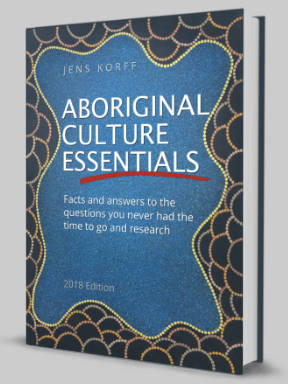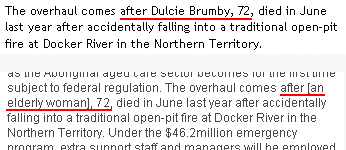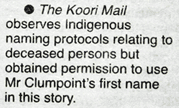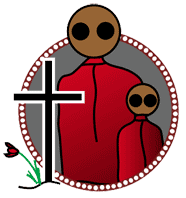People
Sorry Business: Mourning an Aboriginal death
The Aboriginal tradition of not naming a dead person can have bizarre implications. Sorry business includes whole families, affects work and can last for days.

Wishing you knew more about Aboriginal culture? Search no more.
Get key foundational knowledge about Aboriginal culture in a fun and engaging way.
This is no ordinary resource: It includes a fictional story, quizzes, crosswords and even a treasure hunt.
Stop feeling bad about not knowing. Make it fun to know better.
Why can't you name a dead Aboriginal person?


Many Aboriginal films, books or websites warn Aboriginal people that they might show images of Indigenous people who have passed away. But some don't. Why is this so?
The tradition not to depict dead people or voice their (first) names is very old [4]. Traditional law across Australia said that a dead person's name could not be said because you would recall and disturb their spirit. After the invasion this law was adapted to images as well.
Today these strict laws are generally not followed where colonisation first happened, like on Australia's east coast and in the southern parts of the country.
In the Northern Territory, where traditional Aboriginal life is stronger and left more intact, the tradition of not naming the dead is still more prevalent.
Today naming protocols differ from place to place, community to community [5] and it is often a personal decision if names and images of a deceased Aboriginal person can be spoken or published.
Even in places where, traditionally, the names of deceased people are not spoken or written, families and communities may sometimes decide that circumstances permit the names of their deceased loved ones to be used.
Substitute names
In some areas, families may determine that a substitute name such as 'Kumantjayi', 'Kwementyaye', 'Kunmanara' or 'Barlang' may be used instead of a deceased person's first name for a period. This is also known as a 'bereavement term'.
For example, 'Kumantjayi Perkins' is now increasingly referred to once again as the late 'Charles Perkins' [5].
Story: Not allowed to say 'Tuesday'
A reader of the ABC website recalls how substitute names can make everyday life more complicated [6].
"In one community that I had associations with in central Australia white officials in the 1930's and 40's had given many people 'white' names based on the day of the week on which they were born.
"When I was there in the 1970's several of these people had recently died.
"This caused problems when children at school were reciting the days of the week. The word 'Kwementyaye' was used locally in place of a name that couldn't be used. The week at school accordingly became 'Monday, Kwementyaye, Wednesday, Kwementyaye, Kwementyaye, Kwementyaye, Sunday'. Within a couple of years, though, all of the days of the week could be freely used again."
Sorry business
When Aboriginal people mourn the loss of a family member they follow Aboriginal death ceremonies, or 'sorry business'. Sorry business can mean any stage of the grieving process.
Aunty Margaret Parker from the Punjima people in north-west Western Australia describes what happens in an Aboriginal community when someone dies.

"A cultural practice of our people of great importance relates to our attitude to death in our families. Like when we have someone passed away in our families and not even our own close families, the family belongs to us all, you know. The whole community gets together and shares that sorrow within the whole community."
"It don't have to be a close family. We say it is close because of our kinship ties and that means it's family. We all get together till that funeral, till we put that person away. So every time someone comes into town whom we haven't seen, that could be two or three days after we get the bad news, we all get together and meet that person, we have to drop what we're doing and get together."
"We have to cry, in sorrow, share our grief by crying and that's how we break that [grief], by sharing together as a community. This is an important aspect of our culture. And this is how we are brought up. I see it is lacking in a lot of other towns where we go. We go there to meet people and to share our sorrows and the white way of living in the town is breaking our culture."
"And a lot of towns you go to for funerals, want to do their own little individual things, instead of dropping what they're doing to get together to meet the people coming in from out of town. The family has to sit in one house, or one area, so people know that they have to go straight into that place and meet up. We go and pay our respects. You supposed to just sit down and meet, eat together, share, until that body is put away, you know. Afterwards, we do whatever we want to do, after we leave that certain family..."
"Nowadays, people just come up and shake hands, want to shake hands all the time. To me it's hurting, because we all know and we grew up in our culture system and that means we should embrace others to share the sorrow, men and women." [8]
We own our grief and allow it to heal slowly.
— Miriam-Rose Ungunmerr-Baumann, Aboriginal activist, educator and artist [9]
Yolnu elder Djambawa Marawili from Arnhem Land in the NT explains how funerals strengthen family ties and relationships.
"When the funerals are held here in the homelands the ceremonies all come out. It is really very important that the kinship structures are laid on, the patterns and designs are all there, we always use them, the stories beyond this country we always share to the children and also to tell the other groups that are coming to join with us, our neighbours, yothu yindi [Yolngu for "child and mother"] or märi gutharra ["grandmother and grandchild"] they are “title-y” connected. That’s why they always learn when we have närra thing [important ceremony] or when we have death, that’s when we get together. And it goes along, it's telling us that we are really “title-y” connected like in a märi/gutharra yothu/yindi." [10]
Ceremonies and mourning periods last days, weeks and even months depending upon the beliefs of the language group and the social status of the deceased person. But time is also essential in the healing process. "When a relation dies, we wait a long time with the sorrow. We own our grief and allow it to heal slowly," says Elder Miriam-Rose Ungunmerr-Baumann, an Aboriginal activist, educator and artist from the Northern Territory, renown for the concept of deep listening (dadirri). [9]
Burials can also be delayed due to family disputes concerning the origin of the person (which relates to where they can be buried), or the inheritance of their land and property.
Aboriginal children often can take time off school for the duration of the ceremonies, however if their family receives any Government payments, such as Centrelink, they cannot stay away for more than a week in order for the family not to lose their entitlement. [11]
Note that it is culturally inappropriate for a non-Aboriginal person to contact and inform the next of kin of a person’s passing. This breach of cultural protocol may cause significant distress for Aboriginal families connected to the person whom has passed.
In Aboriginal society when somebody passes away, the family moves out of that house and another moves in. Families swap houses [12]. Some families live in sorry camps some distance away.
Story: Too many deaths: "You can't take it anymore"
Wiradjuri woman Jenny Munro has seen far too many deaths. She describes the toll on Aboriginal communities [13]:
"We are suffering from so many and continuing deaths brought about by injustice – deaths in custody, youth suicide, inequality in healthcare provision and the like, and each death compounds with another one and another one so we don’t have a chance to grieve each loss individually.
"You get to a point where you can’t take any more and many of our people withdraw from interacting with other members of their community because it’s too heartbreaking to watch the deaths that are happening now in such large numbers.
"The deaths are a result of the oppression we are facing under this system. In 227 years we have gone from the healthiest people on the planet to the sickest people on the planet."
Grieving services
- 13YARN provides First Nations crisis support (call 139 276, 24/7 service).
- Australian Centre for Grief and Bereavement, call 1800 642 066.
- Grief Line, call 1300 845 745.
- SANDS is a 24/7 bereavement support line (call 1300 308 307 or visit sands.org.au).
- Beyond Blue, call 1300 224 336 or visit beyondblue.org.au.